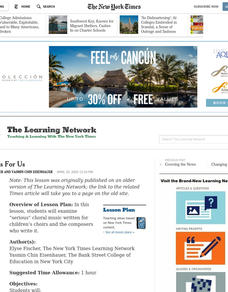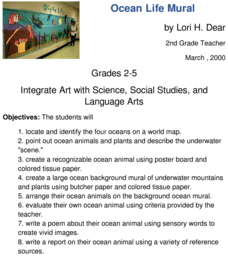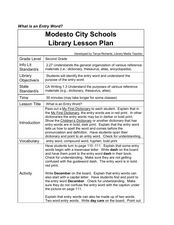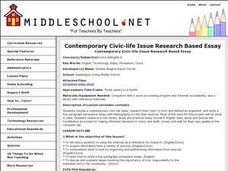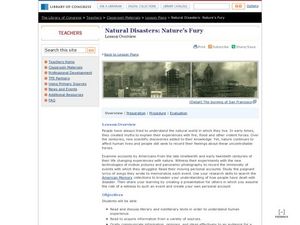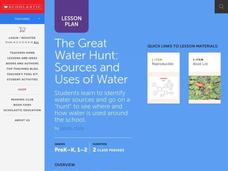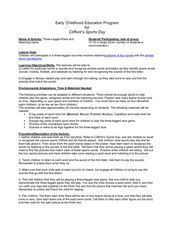Curated OER
George Washington: First in War, First in Peace, and First in the Hearts of His Countrymen
Students interpret historical evidence presented in primary and secondary resources. In this George Washington lesson, students research the details of Washington's military successes, his role at the Constitutional Convention, and his...
Curated OER
Immigration History Firsthand
Middle schoolers interpret historical evidence presented in primary and secondary resources. In this immigration lesson, students conduct research regarding Ellis Island and the American immigrant experience. Middle...
Curated OER
The Grapes of Wrath: Scrapbooks and Artifacts
Learners interpret historical evidence presented in primary and secondary sources. In this Great Depression lesson, students read John Steinbeck's The Grapes of Wrath and use ethnographic research processes...
Curated OER
Suffrage Strategies: Voices for Votes
Learners discuss the history and importance of voting. In this voting lesson, students research the women's suffrage movement and the methods used to change people's beliefs about suffrage for women. Learners also create posters to...
Curated OER
Waldseemuller's Map: World 1507
Students investigate the 1507 word map. In this world geography lesson, students examine the details of each section of the map and then draw conclusions about how the people of 1507 understood the world. Students are evalated on...
Curated OER
A Chorus For Us
Students examine "serious" choral music written for student choirs and the composers who write it. They reflect upon the notion of "serious" music, and examine the trend of concert composers writing pieces for student chorus
Facing History and Ourselves
Exploring Raphael Lemkin's Actions: The Invention of the Word "Genocide"
Learners examine the contributions of Raphael Lemkin. For this genocide activity, young scholars consider how Lemkin defined the atrocities of the Holocaust as he coined the term "genocide." Learners discuss the definition of genocide as...
Curated OER
So Sweet
Young scholars compare sugar levels in cereals. In this nutrition lesson, students learn how to read a nutrition facts label, predict which products will have the most sugar, discover which cereals contain the most sugar and...
Brigham Young University
Understanding the Research Process
The second lesson in a unit on set design focuses on the importance of historical and stylistic research. Working in teams created in the previous session, groups consider what resources they will use as they consider design concepts for...
Curated OER
Art: Weaving Based on Draft Patterns
Fourth graders observe the process of drafting a pattern on graph paper. After creating their own patterns, they create their own weavings, and explain its title to the class.
Facing History and Ourselves
Analyzing Historical Evidence
High schoolers examine World War I war crimes. In this world history instructional activity, students use primary and secondary sources to research and understand the systematic nature of the Armenian Genocide. High schoolers reflect on...
Curated OER
Be That As It Maya
Creative projects are a great way to engage your class and can be a fun way to assess mastery! Learners create brochures and postcards that might have been created by and for travelers to ancient Mayan cities. They read and discuss the...
Curated OER
Ocean Life Mural
How many oceans can you name? First, have learners try to name as many oceans as they can, and then have them locate and identify the oceans on a world map. They create a recognizable ocean animal using poster board and tissue paper....
Curated OER
Dictionary Work - Entry Words
Second graders examine the use of entry words in the dictionary. In this dictionary use lesson, learners look at guide words in a children's dictionary as the teacher/librarian describes the characteristics of each entry. They complete...
Curated OER
Creating Context Mural
students examine the historical, political, religious and culture aspects of the Renaissance. Using this information, they read "Galileo" by Bertolt Brecht. They use the internet to research a specific event of the time period and come...
Curated OER
Contemporary Civic-life Issue Research Based Essay
Seventh graders write a five paragraph persuasive essay on a contemporary civic-life issue.
Curated OER
Measuring Activities
Students measure using both metric and standard measures. They convert from one standard to the next while measuring distances in their home or classroom.
Curated OER
Sectionalism in Early U.S.
Young scholars, divided into three groups, representing the Northeastern, Southern, Western United States. They research these areas in early American history and as a group prepare charts, graphs and reports. They explain their needs...
Curated OER
Carnavals and Colonialization
Ninth graders compare and contrast different Carnavals throughout Latin America. In this Latin American lesson, 9th graders study the geography and colonial history of Latin America.
Curated OER
Natural Disasters: Nature's Fury
Young scholars explore the human experience. In this business ethics instructional activity, students analyze primary sources to develop an understanding of the American natural disasters of the 19th and 20th centuries and the...
Curated OER
L I V I N G U N D E R C O M M U N I S M
Students examine a communist regime and what it means to live within a communist societyl.
Curated OER
Types of Popular Music
Learners listen to different types of music, such as bluegrass, rap and blues. They identify different styles of music and musical instruments. They discuss how the music reflects culture.
Curated OER
The Great Water Hunt
Students create a model of the land to water ratio in a large group and search for all the places water is used at their school while on a Great Water Hunt. They identify where water can be found and compare how much of world is covered...
Curated OER
Clifford's Sports Day
First graders participate in a game of three legged race that involved the practice of matching pictures or text. They use the subject of sports to create the context. Students play the game to strengthen classification and reading...







